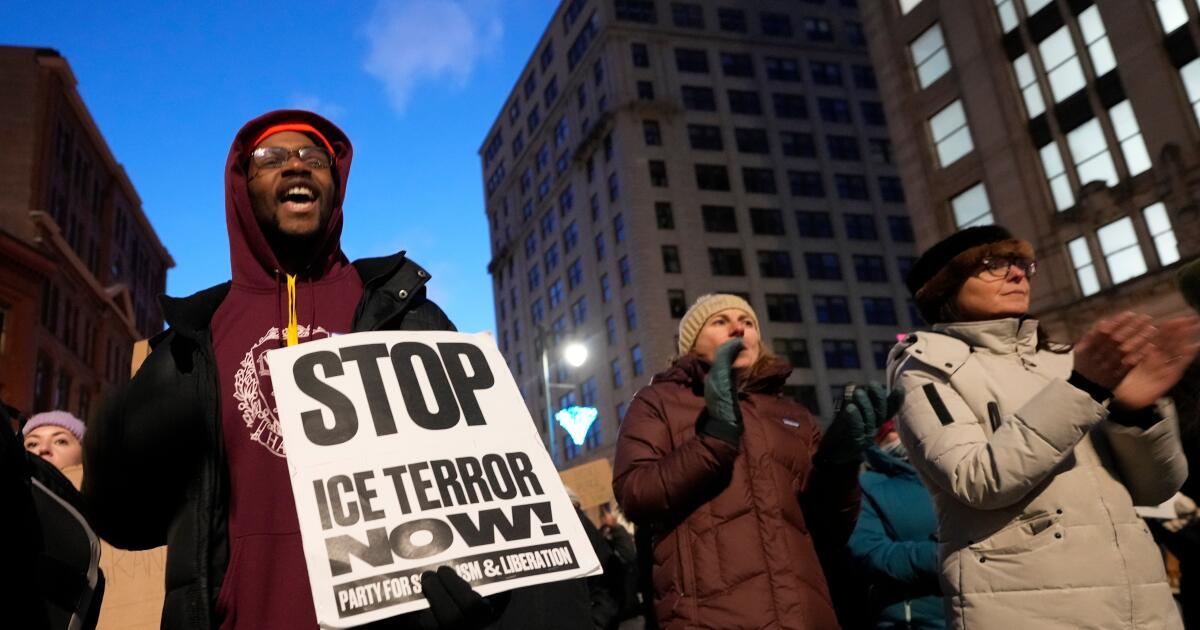Sen. Susan Collins announces end to ICE large-scale operations in Maine after talks with Noem
PORTLAND, Maine — U.S. Sen. Susan Collins of Maine said Thursday that immigration officials have ceased their “enhanced operations” in the state, the site of an enforcement surge and more than 200 arrests since last week.
Collins, a Republican, announced the development after saying she had spoken directly with Secretary of Homeland Security Kristi Noem.
“There are currently no ongoing or planned large-scale ICE operations here,” Collins said in a statement, referring to U.S. Immigration and Customs Enforcement. “I have been urging Secretary Noem and others in the Administration to get ICE to reconsider its approach to immigration enforcement in the state.”
The announcement came after President Trump seemed to signal a willingness to ease tensions in Minneapolis after a second deadly shooting there by federal immigration agents.
Collins said ICE and Border Patrol officials “will continue their normal operations that have been ongoing here for many years.”
An email seeking comment was sent Thursday to the Department of Homeland Security.
Collins’ announcement comes more than a week after immigration officers began an operation dubbed “Catch of the Day” by ICE. Federal officials said about 50 arrests were made the first day and that roughly 1,400 people were operational targets in the mostly rural state of 1.4 million residents, 4% of whom are foreign-born. ICE said more recently that more than 200 people have been arrested since the operation started.
In Lewiston, one of the cities targeted by ICE, Mayor Carl Sheline called the scale-down welcome news, describing the agency’s operations as “disastrous” for the city and others.
“ICE operations in Maine have failed to improve public safety and have caused lasting damage to our communities. We will continue working to ensure that those who were wrongfully detained by ICE are returned to us,” said Sheline, who leads a city where the charter requires the mayoral position to be nonpartisan.
Homeland Security Assistant Secretary Tricia McLaughlin last week touted that some of the arrests were of people “convicted of horrific crimes including aggravated assault, false imprisonment, and endangering the welfare of a child.” Court records painted a slightly different story: While some had been convicted of felonies, others were detainees with unresolved immigration proceedings or who were arrested but never convicted of a crime.
Collins, a veteran senator, is up for reelection this year. Unlike a handful of Republican senators facing potentially tough campaigns, Collins has not called for Noem to step down or be fired. She’s also avoided criticizing ICE tactics, beyond saying that people who are in the U.S. legally should not be the target of ICE investigations.
Democratic Gov. Janet Mills, who announced her Senate candidacy in October and could face Collins in the general election, has challenged immigration officials to provide judicial warrants, real-time arrest numbers and basic information about who is being detained in Maine. She also called on Collins to act after the House’s GOP majority defeated Democrats’ efforts to curtail ICE funding.
Mills’ office did not immediately respond to an Associated Press email seeking comment on Collins’ announcement.
Meanwhile, first-time Democratic candidate Graham Platner — who is running against Mills in the primary — has criticized both Mills’ and Collins’ handling of ICE and has demanded the agency be dismantled. Platner organized a protest Thursday outside Collins’ office in Portland, Maine, where dozens of supporters held signs and sang along with him.
Platner said he would host a separate protest later outside Collins’ Bangor, Maine, office.
Several prominent Maine Democrats expressed guarded optimism about the ICE drawdown while also criticizing the agency’s actions.
“If these enhanced operations have in fact ceased, that may reduce the visible federal presence in our state,” said U.S. Rep. Chellie Pingree, who represents the Portland area. “But I think it is important that people understand what we saw during this operation: individuals who are legally allowed to be in the United States, whether by lawful presence or an authorized period of stay, following the rules, and being detained anyway.
Whittle and Kruesi write for the Associated Press. Kruesi reported from Providence, R.I. AP writer Kathy McCormack in Concord, N.H., contributed to this report.
